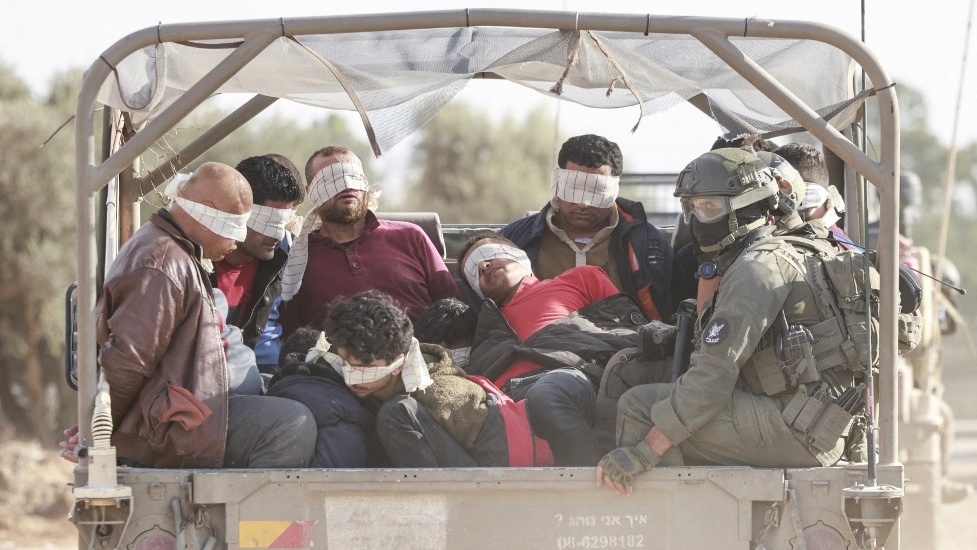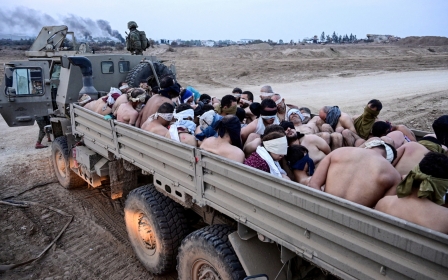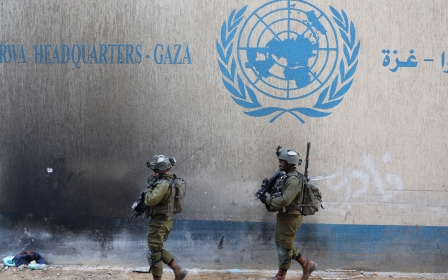How to hold Israel accountable for torturing Palestinians

Torture remains a pervasive reality in Palestine, where countless individuals have endured unspeakable physical and psychological trauma at the hands of Israeli forces.
This has been an especially serious problem since the Gaza war began on 7 October, with Palestinians telling Middle East Eye that they have been physically tortured with dogs and electricity, subjected to mock executions, and held in humiliating and degrading conditions. One man described how he was handcuffed, blindfolded and detained in a metal cage for 42 days.
Addressing such grave human rights violations demands a comprehensive approach, including the development of specialised skills for healthcare professionals tasked with documenting and treating survivors.
Trained in the Istanbul Protocol for torture documentation, I have dedicated myself to equipping fellow professionals with the necessary tools to navigate this challenging terrain.
As violence continues to escalate - with torture not restricted to detention centres, but also witnessed in the streets of the occupied Palestinian territories and captured on video - it is more imperative than ever to bolster health workers’ capacities to document such incidents, thus amplifying the voices of survivors in their pursuit of justice.
New MEE newsletter: Jerusalem Dispatch
Sign up to get the latest insights and analysis on Israel-Palestine, alongside Turkey Unpacked and other MEE newsletters
Palestinians have been systematically oppressed for decades, with more than 800,000 arrested since 1967. Inside Israeli detention centres, many have faced brutal physical and psychological abuse that meets the stringent criteria for torture set forth by the United Nations.
Key elements of torture include the intentional infliction of severe mental or physical suffering for a specific purpose, with the involvement of someone acting in an official capacity. The surge in cases since 7 October serves as a stark reminder of the urgent need to document these atrocities and hold perpetrators accountable before the international community.
Barbaric tactics
The torture tactics employed against Palestinians are as varied as they are barbaric, ranging from crude physical beatings to sophisticated “no-touch” techniques imported from global interrogation practices. Israel has also exported specific torture methods, such as the “Palestinian chair” stress position.
In addition to inflicting excruciating pain through tactics such as suspension and simulated drowning, Israeli forces have employed psychological warfare, exploiting cultural sensitivities and individual vulnerabilities to amplify the suffering of their victims. Sleep deprivation is an essential part of psychological torture.
Follow Middle East Eye's live coverage of the Israel-Palestine war
Reports of sexual abuse, including rape and forced nudity, underscore the depravity to which detainees are subjected. The insidious combination of physical and psychological torture serves not only to punish, but also to extract coerced confessions. Such practices scar and traumatise survivors and their families, while intimidating the broader Palestinian community.
Central to the efficacy of torture is its capacity to shatter the psychological resilience of victims, reducing them to a state of helplessness and dependency. Through systematic degradation and manipulation, interrogators erode the victim’s sense of self, replacing it with a pathological identification with their abuser.
This insidious dynamic distorts the victim’s perception of reality and undermines their ability to articulate their ordeal coherently. Long after the physical wounds have healed, survivors grapple with myriad psychological consequences, including traumatic stress disorder, depression and a profound distrust of others.
The very act of revisiting traumatic memories can trigger intense emotional distress or avoidance behaviour
These enduring psychological scars pose serious challenges to the documentation process, as survivors navigate an inner labyrinth of trauma-induced memory deficits, confusion and emotional distress. They might have difficulty recalling and recounting their experiences. Memory deficits, coupled with pervasive fear and distrust, often impede their willingness to engage in the documentation process.
The very act of revisiting traumatic memories can trigger intense emotional distress or avoidance behaviour, further complicating efforts to elicit coherent narratives. As healthcare professionals, we must remain attuned to these challenges, employing trauma-informed approaches that prioritise survivors’ autonomy and well-being, while seeking to uphold their right to truth and justice.
In the face of such abhorrent human rights violations, the Istanbul Protocol offers a standardised framework for documenting torture that is grounded in compassion and human dignity. By equipping healthcare professionals with the necessary skills and resources, we can empower torture survivors to reclaim agency over their narratives, amplifying their voices in the pursuit of accountability and redress.
As we strive to combat torture and uphold the rights of victims, let us stand in solidarity with survivors, bearing witness to their pain and advocating tirelessly for a future free from oppression and impunity.
The views expressed in this article belong to the author and do not necessarily reflect the editorial policy of Middle East Eye.
Middle East Eye delivers independent and unrivalled coverage and analysis of the Middle East, North Africa and beyond. To learn more about republishing this content and the associated fees, please fill out this form. More about MEE can be found here.





